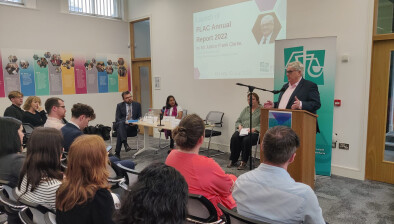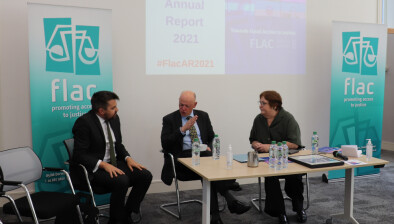NI High Court: Application to appoint McKenzie friend refused

Northern Ireland’s High Court has refused to appoint a McKenzie friend in family law proceedings on the basis that she attempted to inappropriately influence the court and lacked a basic understanding of practice and procedure.

About this case:
- Citation:[2023] NIFam 22
- Judgment:
- Court:NI High Court
- Judge:Judge David McFarland
Delivering judgment for the High Court, Mr Justice David McFarland determined: “This type of correspondence is entirely inappropriate and displays not only a basic lack of understanding of practice and procedure in the courts but also a similar lack of understanding of core fundamental aspects of what a fair and transparent hearing before an impartial tribunal actually involves.”
Background
The proceedings concerned a young child in respect of which a trust brought a care application. The child’s mother had a history of abducting her and removing her across the border to the Republic of Ireland.
Earlier proceedings in 2021 resulted in various orders being granted, including a residence order in favour of the child’s father and an order prohibiting the mother from removing the child from the jurisdiction. In the course of those proceedings, and based upon a consultant psychiatrist’s report, the court ruled that the mother lacked litigation capacity and appointed the Official Solicitor as her guardian ad litem.
In July 2022, the child was abducted by her mother again, only being returned following proceedings in Dublin. In August 2022, the trust applied for a care order and the court issued interim supervision orders. Having unsuccessfully applied for a residence order and an extensive contact order in June 2023, the mother abducted the child again.
The child’s mother expressed continuing frustration concerning her legal representation, and so a hearing on the mother’s litigation capacity was convened.
The High Court
Mr Justice David McFarland began by stating that “there is a presumption that all litigants do have capacity. Although the phrase ‘borderline capacity’ is often used it is not recognised in law. This is a simple binary decision.”
Noting that the mother was refusing to be re-assessed by the consultant psychiatrist or any psychiatrist and that the psychiatrist’s report before the court was nearly three years old, the court confirmed that “she cannot be forced to undergo such an examination” as per Galo v Bombardier [2023] NICA 50.
Finding that the test for litigation capacity is based upon Article 3 of the Mental Health (NI) Order 1986, the judge considered that he was required to be satisfied that the mother “suffers from a ‘mental disorder’ which means a mental illness, a mental handicap or any other disorder or disability of mind”.
The judge qualified this by stating: “Although a personality disorder was excluded from this definition… it can be included by virtue of a direction of the Lord Chief Justice made under section 75(2)(b) of the Judicature (NI) Act 1978 and dated 4 April 2019.” Nonetheless, the court felt that there were was insufficient evidence before it to rebut the presumption of the mother’s capacity, and so the court ruled that she had litigation capacity and allowed her legal representation to come off record.
The court reconvened on 8 December 2023, and an application was made for the appointment of a McKenzie friend given that the mother was then a litigant in person. The court heard that the proposed McKenzie friend had been trained by a solicitor for over 11 years, that she had “advocated” for many families in court and that she had never been refused permission to act as an “advocate” or a McKenzie friend in any court. The court noted: “No corroborative evidence was produced concerning these assertions.”
The court considered Practice Note 03/2012 — McKenzie Friends (Civil and Family Courts) and judgments including Re O’Connell [2005] EWCA Civ 759, Brennan v Doherty [2018] NICh 27 and Ulster Bank v Pollock [2021] NICh 23 concerning the appointment and conduct of McKenzie friends.
Mr Justice McFarland opined that emerging from those authorities and the Practice Note is a strong presumption in favour of the appointment of a McKenzie friend, unless there is a good reason to refuse same. The court considered that a McKenzie friend could be refused in certain scenarios, including where assistance is provided for an improper purpose, is unreasonable in nature or degree, where the McKenzie friend is directly or indirectly conducting the litigation, and where the McKenzie friend is subject to a court order or has been declared as a vexatious litigant.
The judge continued, highlighting that factors which alone are insufficient to justify refusal including that the McKenzie friend belongs to an organisation that promotes a particular cause, where the other party is not represented, and where the proceedings are confidential and the court papers contain sensitive information relating to family affairs.
The court considered an email sent to him by the proposed McKenzie friend on 4 December 2023, which was copied to another “McKenzie friend” and which identified the mother and father by their names.
The judge stated: “Although Ms Morris at the hearing stated that she wrote to me to bring to my attention the difficulty with the mother’s current solicitor, the contents of the email extend well beyond that purpose. It not only included legal submissions but also purported to give evidence.”
Finding that he would have “no hesitation in determining that the mother would benefit from a McKenzie friend”, the judge considered: “The question is whether Ms Morris is an appropriate person to give that assistance and advice as a McKenzie Friend… despite her claim to have had 11+ years of training from a solicitor and working with that solicitor she does display a worrying lack of understanding of the basic practice and procedure of the family courts. She appeared to be unaware of the rules with regard to confidentiality with regard to identifying a child.”
Mr Justice McFarland emphasised: “By sending the email directly to me without notice to the other parties, Ms Morris was attempting to influence me inappropriately in relation to this case. She has also indicated that she will also be writing to two other judges as she believes a ‘more senior judge’ should deal with the case.”
Conclusion
Finding that this “type of correspondence is entirely inappropriate and displays not only a basic lack of understanding of practice and procedure in the courts but also a similar lack of understanding of core fundamental aspects of what a fair and transparent hearing before an impartial tribunal actually involves”, Mr Justice McFarland refused the application.
A Health and Social Care Trust v A Mother and A Father In the matter of a female child aged 6 years 10 months [2023] NIFam 22










